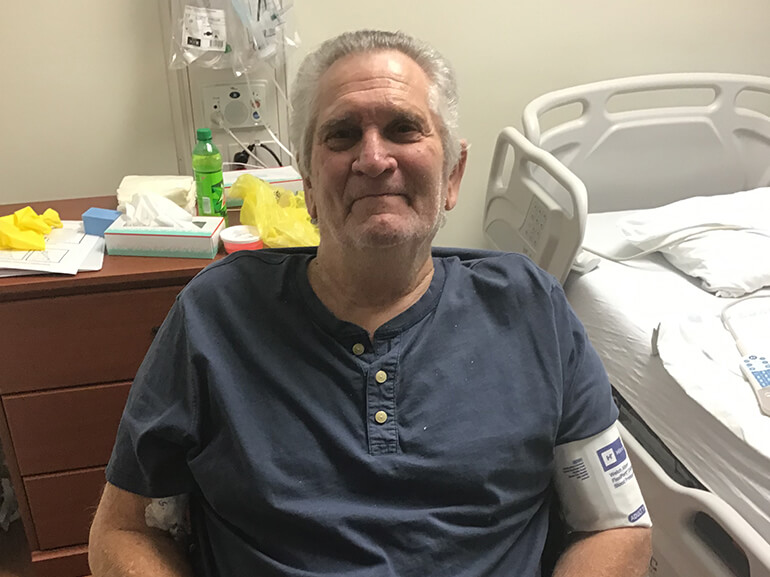Nelson's Story

After years as an equipment operator at a paper mill, 70-year old Nelson Kennedy was enjoying retirement along with his wife, Jane, and his stepdaughter. Then, in early September while watching television, Nelson began experiencing difficulty breathing and weakness throughout his body. Concerned, Jane took him to the local emergency department. It was a good decision because Nelson continued to rapidly decline. After several tests, Nelson was diagnosed with COVID-19 pneumonia, and was sent via ambulance to Ochsner Medical Center – Northshore. Shortly after arrival, he was placed on a ventilator in the ICU.
After two months, Nelson stabilized and was ready for the next care setting to continue his recovery. Doctors and Jane selected Northshore Rehabilitation Hospital.
He arrived with weakness in all four limbs and was completely dependent for all daily living activities, transferring from one surface to another and all levels of mobility. However, Nelson was determined to get better, saying, “I wanted to be able to take care of myself and walk out of here.”
In physical therapy, Nelson initially performed seated resistance exercises such as squeezing a resistance ball between his legs and resistive leg exercises using a therapy band. He then progressed to standing balance training and increased his lower leg strength by using the SCIFIT recumbent stepper. After the balance activities and leg strengthening, Nelson was ready to begin using a rolling walker for walking short distances, eventually reaching 60 feet with just light hands-on assistance.
In occupational therapy, the team focused on increasing Nelson’s upper body strength by using hand weights, weighted dowel sticks and the seated arm bicycle. Once his upper body strength had improved, they began working on bed mobility and transferring from one surface to another, such as from the wheelchair to the bed, the toilet and the tub bench. The transfer activities were initially performed with the therapist having to assist with lifting Nelson. However, with the daily therapy intervention, Nelson was able to stand and perform these transfer tasks with a rolling walker and hands-on assistance. The therapists also taught Nelson how to use adaptive equipment to perform self-care tasks for lower body dressing and bathing.
Nelson credits his therapy team for the progress he made during his stay. “I still have nerves and muscles that need to wake up, but I’m doing a lot better.” He recalls an early turning point in his recovery at Northshore Rehabilitation. “By the end of the first week, I could tell I was able to do more and move a lot better.”
Although interaction with his family was limited due to COVID-19 visitation restrictions, Jane was very supportive, attending family training and visiting Nelson as often as she could. Additionally, Nelson’s whole family prayed for him, which helped keep his spirits high.
In late November, Nelson was thrilled to return home. Upon discharge, he was able to walk 60 feet with a rolling walker and required minimal assistance to complete his daily self-care routine. Nelson plans to continue his recovery with home health services.
Although Nelson’s recovery journey was difficult, he learned a lot about himself in the process, sharing “I knew that the good Lord kept me here for a purpose, and I knew that I needed to make changes in my life.”